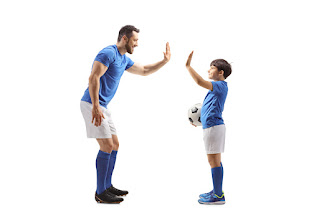Student development occurs as a result of reciprocal give-and-take actions between the teacher and the pupil. This means that the well rounded teacher needs to support his or her students outside of the classroom. Consequently, this simple task of expressed interest in a child reaps benefits within the classroom.
Today’s post summaries Mike Robert’s 3rd Hack in his book, ” Hacking Classroom Management: 10 Ideas To Help You Become the Type of Teacher They Make Movies About.”
Supporting Your Students Outside the Classroom
Supporting your students outside the classroom could include any number of activities. You can support them in a music concert or in a school play. Attend a club ceremony or see a school athletic game. All of these activities get noticed by the student and adds intrinsic value on you as an an educator in the hearts and minds of the student.
“15 Relevant Educator Questions to Strengthen Student Enjoyment in Class” is an opportunity to highlight a teacher’s internal dialogue to improve their teaching. That is to say; some teachers go into their classrooms cold, void from thoughtful planning, it is essential to carefully give thought to our teaching strategies so that students get value and enjoyment from our instruction.
Please subscribe to the channel and leave a comment below!
Band Buzz Blog – BandBuzz.org
The Music Educator Podcast – themusiceducatorpodcast.com
Twitter – twitter.com/MusicEducating
Facebook – facebook.com/themusiceducatorLLC
Linkedin – linkedin.com/in/bill-stevens-7111a115b/
This presentation contains images that were used under a Creative Commons License. Click here to see the full list of images and attributions:
https://app.contentsamurai.com/cc/221254″ />
The Problem
The problem is that often teachers only see the “student side” of kids. The thing is, teaching is not simple. It often takes an enormous amounts of time and energy. You have to create your curriculum, attend meetings, manage school duties, grade and so much more. In addition to that you actually have to teach on a full time schedule.
With all of the complexities and tasks that take place in a single day, it is often difficult to find time in the day to get to know your students. Don’t misunderstand me, you do get to talk and interact with your students however to really build a relationship with them takes even more effort.
For those that do manage to commit and invest the time needed to support your students outside of class you might find a greater sense of trust that’s built. This trust often transfers to fewer classroom disruptions with the child. Ultimately, this lack of disruptions saves time in the class and greater student achievement is possible.
The Classroom Management Hack
Most good teachers are involved in some sort of after school extra-curricular activity. Some of these teachers teach band, choir, theater, clubs and even athletics. The benefit of this is that you get to know your students on a whole new level. In the process you often discover a whole new side to the student. As a result, the better you get to know them, the stronger the student-teacher relationship becomes which ultimately gets translated into the in-class relationship.
In sum, relationships you build outside of the classroom will ultimately bleed into interactions within the classroom. When students see that you are willing to put in the extra effort to support them, the better chance they are willing to return the favor.
Robert’s reflects and identifies that by modeling what it means to be supportive, you set the standard for the behavior you expect from everyone. This also includes yourself. Respect is established due to the voluntary rapport created through interactions at the extracurricular level.
You may ask, “What does supporting students by attending extracurricular events really do?” The simple answer is, it shows your students that you care about them beyond your subject area and that you are willing to give up some of your personal time to support them in their activities that they enjoy doing.
What Can You Do Tomorrow
Almost anything in teaching requires some sort of planning. The following suggestions are some steps that you can implement tomorrow.
Talk to Students About Coming To Their Events
Often, in teaching, you don’t hear about events until they have taken place. Make it a point to connect with students and ask what events they are involved in that are coming up. This approach may also provide a communication gateway into learning about activities that you may never have known about otherwise.
Look at the Calendar and Create a Plan
For a large majority of the school year, there often seems to be something going on. Take a look at the upcoming events on the school calendar and see which ones work with your schedule. Then find out from your students which ones they are involved in. Then commit and set the date in your calendar.
Create a Schedule to Attend Events
Finally, you can then print up poster, create a table with the big bulletin board paper or tape off a portion of your board and label it “Upcoming school Events.” Robert’s recommends including a section of the table identifying the date, time, event and location of future activities. Making this visible for all to see is a great way to keep you and your students posted. This also helps students become engaged with what their classmates are doing, further solidifying the community vibe.
The Blueprint
Step 1. Decide if this is Possible
Even though this classroom management hack doesn’t require you to commit to becoming a coach or director of some type, it requires using personal time. Start by considering whether or not you can do it. Remember family commitments should come first so if you have to pick up your child from day care, don’t feel guilty you can’t make a student’s basketball game. But if you can attend events then stay positive and make it a point to smile. Look like you want to support your students rather than treating it as an obligation and a task that is on a checklist.
Step 2. Find an Event You are Interested in
Don’t make attending an event something you dread. Rather, find an event that will interest you. The more engaged you are, the bigger the return. If you connect with your student during or after the event about the activity, the further it will strengthen your relationship.
Step 3. Invite Colleagues to Join You
Once you are set on attending an event, then invite a teacher friend or staff friend to join you. Consequently, you not only strengthen the relationships you have with your students but also with colleagues. This also provides a mind set that you also have a social life outside of the classroom.
Step 4. Attend the Event
Regardless of the amount of time you spend at the event, the payoff in the classroom will be apparent. If you want to develop a greater sense of street cred amongst you students, sit amongst them in the crowd. This gives them the opportunity to see you from your non-teacher side.
Step 5. Hype up the Event in Class the Next Day
Attending the event is only the first step in building a greater sense of rapport with your students. The next step is to talk with your students about it afterwards. Be sure to hype and praise those students that were involved in the activity. In addition, don’t forget to talk with other students who you saw in the crowd. You can ask them what their favorite parts were about the event.
Step 6. Plan Your Next Event
Don’t think that attending events should be a once a year activity. To truly have a positive impact on your students, be sure to make this a regular part of your routine. Just check your calendar and plan your next event!
Overcoming Excuses
No lie – this hack is probably one of the more time intensive ones however, it can have a huge positive impact on your classroom management. Time management during contract hours is one thing however, scheduling events at school during non-contractual time is a whole other ballgame. Here are some possible conflicts that might arise and some considerations you should reflect on.
I Don’t Have 2 Hours a Day to go to Events After School
This is a real concern. If you are like me and you put all your energy into teaching you are probably pretty tired and just want to go home. The good news, again assuming you are not a coach or after school extra-curricular activity director, is you don’t need to stay at school everyday for two hours. All you are being asked to do is to attend an event every so often for a limited amount of time.
Remember a little effort after school, on your part, will go a long way in the classroom. Just being seen for a little while at an event provides some talking points for the next day in class. Possible questions could include, “How did the game end up last night?” or a comment such as, “You had beautiful solo in the piece you played at the band concert.” Ultimately, when kids know you care about them as people, they will be willing to open up and try new things in your class.
The School Events Don’t Interest Me
Look at this hack from a different perspective. If you can say your students interest you then the effort is worth the time. Isn’t this one of the reasons you are a teacher in the first place? Don’t get me wrong it is helpful that the activity you are attending is interesting to you. Try to find a connection with the event in some way to make it more interesting.
I am Their Teacher, Not Their Friend
I think there is a time and place for this statement. Again, this statement is entirely true but it is also important that your strive to support your students and as a result the potential for higher academic performance is possible. You can maintain boundaries and still be friendly and supportive. Remember you are still a representative of the school so it is important to act accordingly.
Conclusion
Consider this, many of today’s classroom management issues often come to be as a result of students not connecting with their teachers. Attending these types of student events at your school is a great way to strengthen the student-teacher relationship. Students make the transfer when they actively see their teachers care enough to support them outside of class. Consequently, they are more willing to show you that they care more about their work inside your classroom.
Source
Roberts, M. (2017). Hacking classroom management: 10 ideas to help you become the type of teacher they make movies about. Times 10 Publications.





